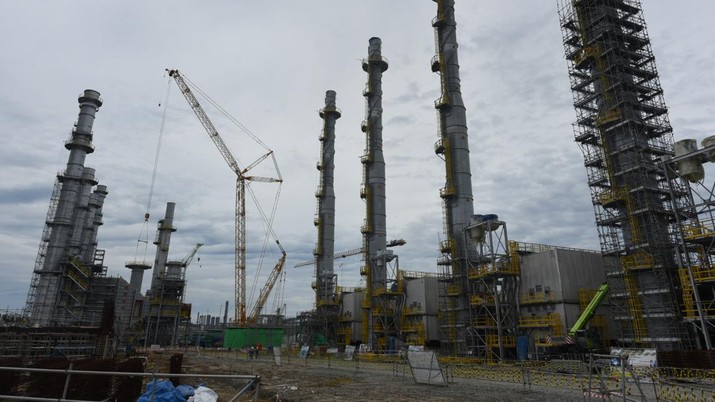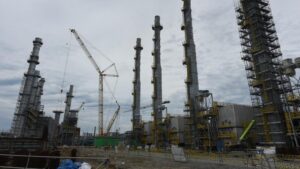

Get ready, Indonesia! In May 2024, a game-changer is coming to the nation’s oil industry – a new giant refinery that will revolutionize the way Indonesia produces and refines oil. This monumental project is set to make waves in the business world and transform Indonesia’s economic landscape. Let’s dive into what this exciting development means for the country and its future.
The Need for a New Giant Refinery
Indonesia’s oil industry has been a crucial pillar of its economy for decades. With the increasing demand for petroleum products both domestically and internationally, there is a pressing need to enhance the country’s refining capacity. A new giant refinery is essential to meet the growing energy needs of Indonesia and reduce its reliance on imported fuel. By investing in this modern facility, the country aims to boost its energy security and strengthen its position as a key player in the global oil market.
The construction of this refinery will not only create job opportunities but also attract foreign investments, driving economic growth across various sectors. Additionally, it will enable Indonesia to produce higher-quality refined products and compete more effectively in the international market. Establishing a new giant refinery is vital for Indonesia’s sustainable development and long-term prosperity in the ever-evolving global energy landscape.
Overview of the New Refinery Project
Indonesia’s new giant oil refinery project is set to revolutionize the country’s oil industry in 2024. This state-of-the-art facility will significantly boost Indonesia’s refining capacity, reducing its dependency on imported petroleum products. The new refinery aims to meet domestic demand while also positioning Indonesia as a major player in the global oil market.
With cutting-edge technology and advanced infrastructure, this mega-project promises increased efficiency and productivity in oil processing. The strategic location of the refinery will facilitate smoother distribution and exportation of refined products, further enhancing Indonesia’s presence in the international trade arena.
Moreover, the new refinery project signifies a significant step towards achieving energy security for Indonesia. By harnessing its abundant natural resources effectively, Indonesia can strengthen its economy and reduce reliance on foreign imports. This development paves the way for a more sustainable and self-sufficient energy future for the nation.
Benefits and Impact on Indonesia’s Economy
The construction of the new giant oil refinery in Indonesia comes with a multitude of benefits and positive impacts on the country’s economy. This project will significantly boost Indonesia’s energy security by increasing domestic oil production and reducing reliance on imports. Moreover, the refinery will create numerous job opportunities for local communities, stimulating economic growth and improving living standards. The increased refining capacity will also enhance export potential, generating foreign exchange earnings for the country.
In addition to creating a ripple effect across various sectors through supply chains and related industries, the project is expected to attract foreign investment and technology transfer. This infusion of capital and expertise can further spur innovation and drive competitiveness in Indonesia’s oil industry. The establishment of this new giant oil refinery holds great promise for catalyzing economic development and positioning Indonesia as a key player in the global energy market.
Challenges and Potential Obstacles
As with any large-scale project, the new giant oil refinery in Indonesia is not without its challenges and potential obstacles. One primary concern is securing sufficient funding for such a massive undertaking. Building and operating a refinery of this magnitude requires significant financial investment that may pose challenges in today’s economic climate. Another obstacle could be navigating the complex regulatory landscape surrounding the oil industry in Indonesia. Ensuring compliance with environmental regulations, obtaining necessary permits, and meeting safety standards are crucial but can also present hurdles along the way.
Additionally, logistical challenges such as infrastructure development and transportation of raw materials to the refinery site may arise. Coordinating various stakeholders, managing supply chains efficiently, and mitigating potential delays will be key factors in overcoming these obstacles. Despite these challenges, with strategic planning, strong leadership, and effective risk management strategies in place, it is possible to address these potential roadblocks head-on to ensure the successful completion and operation of Indonesia’s new giant oil refinery.
Environmental Concerns and Solutions
As Indonesia gears up to welcome a new giant oil refinery in 2024, environmental concerns naturally arise. The operation of such a massive facility can potentially impact the local ecosystem and surrounding communities. From air pollution to water contamination, the risks are significant.
To address these challenges, the Indonesian government and the oil industry must prioritize sustainability measures. Implementing advanced technologies for emissions control and waste management is crucial in mitigating environmental harm. Additionally, regular monitoring and strict compliance with environmental regulations are imperative.
Collaboration between stakeholders, including government bodies, industry players, and environmental organizations, is vital for ensuring responsible practices throughout the refinery’s operations. By fostering transparency and accountability in their actions, Indonesia can strive towards balancing economic growth with environmental preservation for a more sustainable future.
Future Outlook for Indonesia’s Oil Industry
Looking ahead, the future of Indonesia’s oil industry appears promising with the upcoming completion of the new giant oil refinery in May 2024. This state-of-the-art facility is set to significantly boost the country’s refining capacity and reduce its dependence on imported fuel products. With this new infrastructure in place, Indonesia is poised to strengthen its position as a key player in the global oil market. The increased production capacity will not only meet domestic demand but also open up opportunities for export, contributing positively to the country’s economy.
Moreover, advancements in technology and sustainable practices are expected to shape the industry’s trajectory towards more environmentally friendly operations. By embracing innovation and implementing eco-conscious strategies, Indonesia can navigate challenges while ensuring long-term sustainability. As stakeholders continue to invest in modernizing and expanding their facilities, Indonesia stands at a pivotal moment where strategic decisions today will pave the way for a competitive and resilient oil industry tomorrow.
Conclusion
In May 2024, Indonesia will mark a significant milestone with the completion of its new giant oil refinery. This project represents not only a boost to the country’s oil industry but also a step towards enhancing its economy and energy security. Despite facing challenges and environmental concerns, Indonesia is poised to reap the benefits of this ambitious endeavor for years to come.
Stay tuned for more updates on Indonesia’s thriving oil industry as it continues to evolve and make strides in meeting the nation’s energy needs while driving economic growth. The future looks promising for Indonesia’s oil sector as it embraces innovation and sustainability in refining processes. Exciting times lie ahead as the new giant refinery sets the stage for a dynamic era in Indonesian business and energy production!





